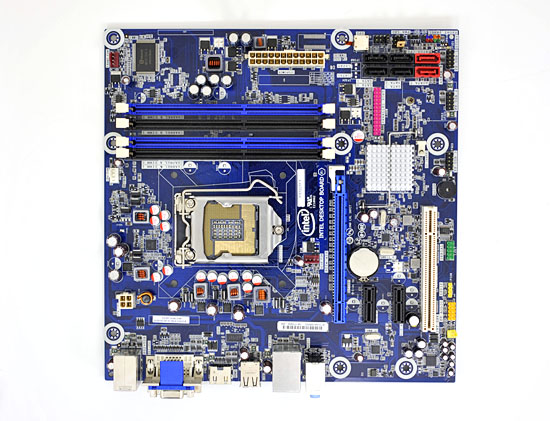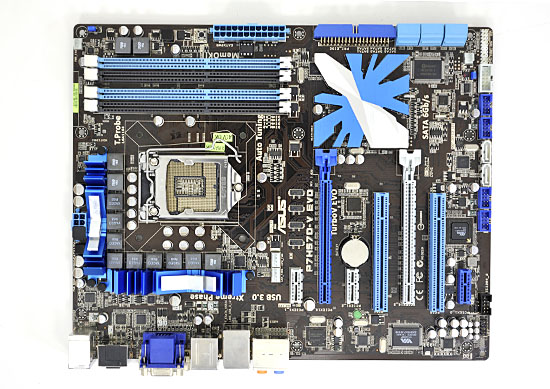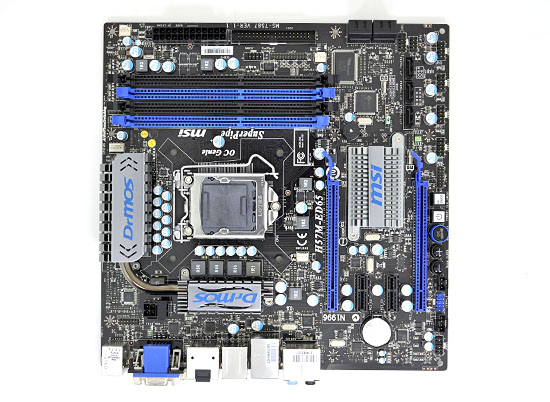The Clarkdale Review: Intel's Core i5 661, i3 540 & i3 530
by Anand Lal Shimpi on January 4, 2010 12:00 AM EST- Posted in
- CPUs
ASUS Saves the Day: Simulated Core i3s
This is the board Intel sent for today's Clarkdale reviews:

It looks cool but it doesn't offer any overclocking features at all. You can't even adjust memory frequency or timings. It's like using a motherboard from ten years ago, just more stable.
The problem is Intel only sent us a Core i5 661 for review. A $196 Core i5 661. And we had no way of underclocking it to simulate a Core i3, the arguably more interesting CPU from today's launch.
I tried some of our P55 boards and had no luck underclocking the chips either. Apparently existing P55 boards need some BIOS help before we'll get that sort of functionality. Thankfully Raja had one of ASUS' boards in house for his upcoming H57 coverage - the P7H57DV-EVO. He confirmed that this board would let me disable turbo mode and decrease the clock multiplier on our i5 661. A FedEx shipment later and we're on track to providing an actually useful review.

ASUS' feature-filled H57 board
Today you'll see results from the Core i5 661 as well as a simulated Core i3 540 and Core i3 530. The GPU clocks are running at the 661's speed for these two simulated chips, but I didn't run any IGP tests with them so it doesn't matter. The uncore clocks are also possibly higher but I'm still waiting for Intel to confirm what the i3 uncore is supposed to be clocked at. In any case, the i3 530/540 results you see here should be close enough to shipping speed. And you can thank ASUS for that.

MSI was also kind enough to send us their H57M-ED65 for use in today's review
The Test
| Motherboard: | ASUS P7H57DV- EVO (Intel H57) Intel DX58SO (Intel X58) Intel DX48BT2 (Intel X48) MSI DKA790GX Platinum (AMD 790GX) Gigabyte GA-MA790GP-DS4H (AMD 790GX) Gigabyte GA-MA790FX-UD5P (AMD 790FX) |
| Chipset Drivers: | Intel 9.1.1.1010 (Intel) AMD Catalyst 8.12 |
| Hard Disk: | Intel X25-M SSD (80GB) |
| Memory: | G.Skill DDR2-800 2 x 2GB (4-4-4-12) G.Skill DDR2-1066 2 x 2GB (5-5-5-15) Corsair DDR3-1333 4 x 1GB (7-7-7-20) |
| Video Card: | eVGA GeForce GTX 280 ATI Radeon HD 5870 (Windows 7) |
| Video Drivers: | NVIDIA ForceWare 180.43 (Vista64) NVIDIA ForceWare 178.24 (Vista32) ATI Catalyst 9.12 (Windows 7 x64) |
| Desktop Resolution: | 1920 x 1200 |
| OS: | Windows Vista Ultimate 32-bit (for SYSMark) Windows Vista Ultimate 64-bit |










93 Comments
View All Comments
rainman1986 - Monday, January 4, 2010 - link
I'm puzzled by the results for this cpu, I'd have thought it would be close to the 920, but it was much slower than the i3 and i5.Did I miss something?
rainman1986 - Monday, January 4, 2010 - link
Sorry, not the 860, the 870 was slower (but the 860 would have been just a little slower than that!)Still, what gives?
deruberhanyok - Monday, January 4, 2010 - link
Possible responses:"I had no idea it had a retro mode!"
"So these processors can run Ultima IX acceptably then?"
"My eyes! The goggles, they do nothing!"
"Intel HD graphics: bringing extreme video quality to 2001's hottest titles!"
And so on.
vol7ron - Monday, January 4, 2010 - link
The Clarkdale Unencrypted score is shown, could you also display the Lynnfield Unencrypted score.To use the unencrypted Clarkdale as the control for Lynnfield doesn't seem right since there are differences between the two procs. It would make more sense to compare
[Lynnfield Encrypted Score]/[Lynnfield Unencrypted Score] to [Clarkdale Encrypted Score]/[Clarkdale Unencrypted Score]
Thanks,
vol7ron
SydneyBlue120d - Monday, January 4, 2010 - link
Thanks a lot for the great review!When You'll be back from CES, I'd like to see a test of:
- Pentium G9650 (the great absent for the corporate/office world);
- Flash 10.1 and BR/MKV HTCP with integrated gfx;
Thanks a lot :-)
SydneyBlue120d - Monday, January 4, 2010 - link
Forgot to ask:Is the integrated gfx DX 10 or 10.1? Will it support Direct2D?
Thanks
ruetheday - Friday, January 8, 2010 - link
yes to DX10 and Direct2Dvol7ron - Monday, January 4, 2010 - link
Raja,Good article. I like how you re-addressed topics that you originally discussed on the opening page, with a more concise statement on the pages that followed. For instance, when talking about the memory on/off die. You gave a decent bit of info on page 1 and then a quick rememberance on page 2.
--- More will come once I finish reading the artice :) ---
vol7ron
Rajinder Gill - Monday, January 4, 2010 - link
Credit goes to Anand for this piece. I only chimed in on the OC side. :)regards
Raja
vol7ron - Monday, January 4, 2010 - link
I noticed something fishy when it said thanks to Raja for the Mobo suggestion. I guess the article's author threw me off :)Great collaboration, regardless.